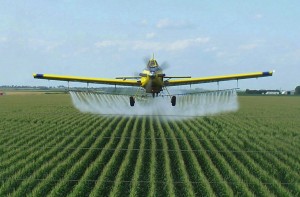The world’s most popular herbicide, glyphosate, has been listed as a probable human carcinogen. Glyphosate is used in conjunction with 80% of genetically modified crops and accounts for around 25% of the global herbicide market.
The International Agency for Research on Cancer, under the auspices of the World Health Organisation, has classified the world’s most widely used herbicide, glyphosate as a ‘probable’ cause of cancer in humans, rating it a 2A classification.
 Glyphosate is a herbicide, a class of pesticide, that is primarily found in RoundUp, Monsanto’s herbicide formula, sprayed on genetically modified crops to kill weeds and bugs. Indeed, 80% of GMO crops are designed to be tolerant to glyphosates. It is also the most popular herbicide globally with 25% of the herbicide market. The glyphosate industry is a US $6 billion annual business. Glyphosate is also used on non-GMO and non-organic crops and plants by farmers and gardeners around the world.
Glyphosate is a herbicide, a class of pesticide, that is primarily found in RoundUp, Monsanto’s herbicide formula, sprayed on genetically modified crops to kill weeds and bugs. Indeed, 80% of GMO crops are designed to be tolerant to glyphosates. It is also the most popular herbicide globally with 25% of the herbicide market. The glyphosate industry is a US $6 billion annual business. Glyphosate is also used on non-GMO and non-organic crops and plants by farmers and gardeners around the world.
The IARC classified glyphosate as a class 2A carcinogen because they found convincing evidence in laboratory studies that animals exposed to glyphosate developed cancers. The IARC also state there is limited evidence that glyphosate causes Non-Hodgkin lymphoma in humans because of the elevated levels of this cancer among farm workers where glyphosate is used. The IARC also state there are studies cited by the United States Environmental Protection Agency showing glyphosate causes DNA and chromosomal damage in human cells.
Web references:
IARC announcement:
IARC Monographs Volume 112: evaluation of five organophosphate insecticides and herbicides
Lancet Oncology article:
Carcinogenicity of tetrachlorvinphos, parathion, malathion, diazinon, and glyphosate









